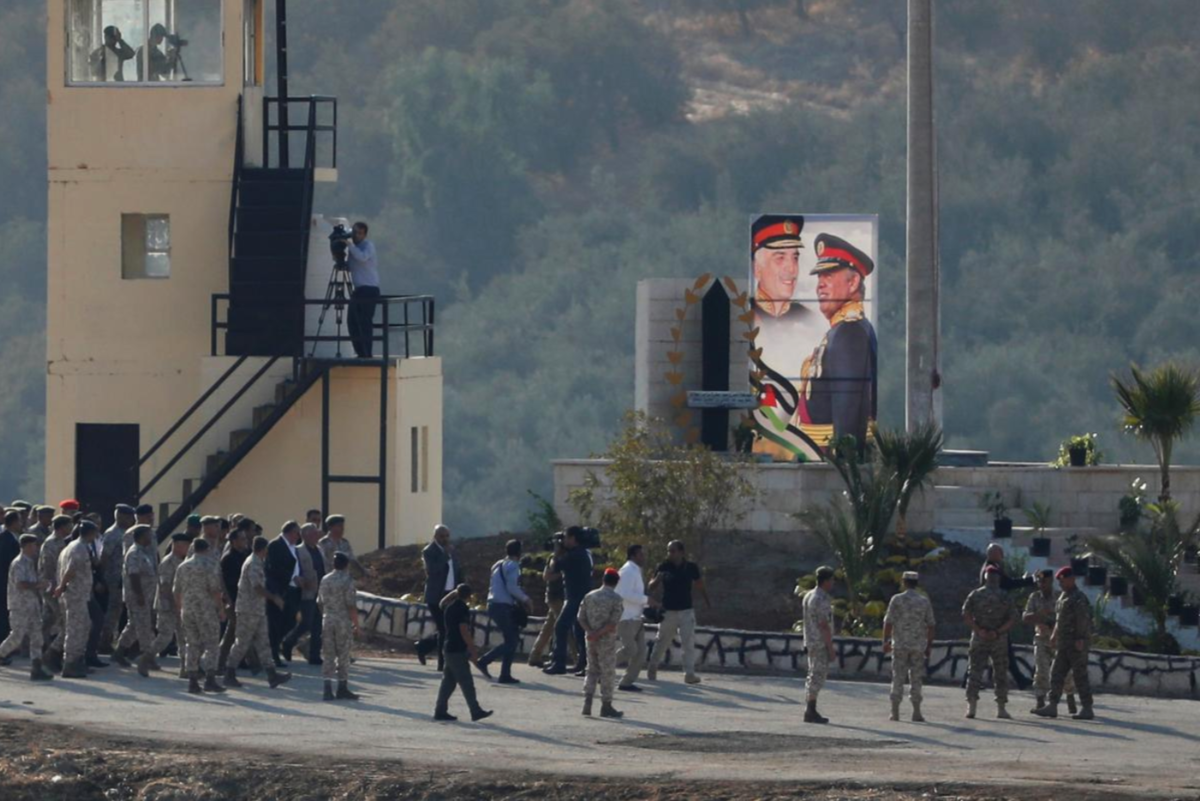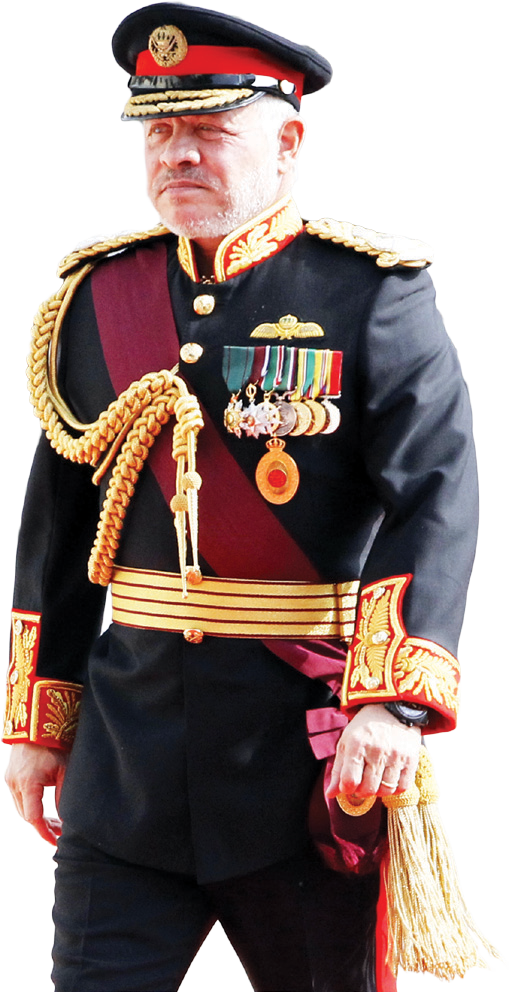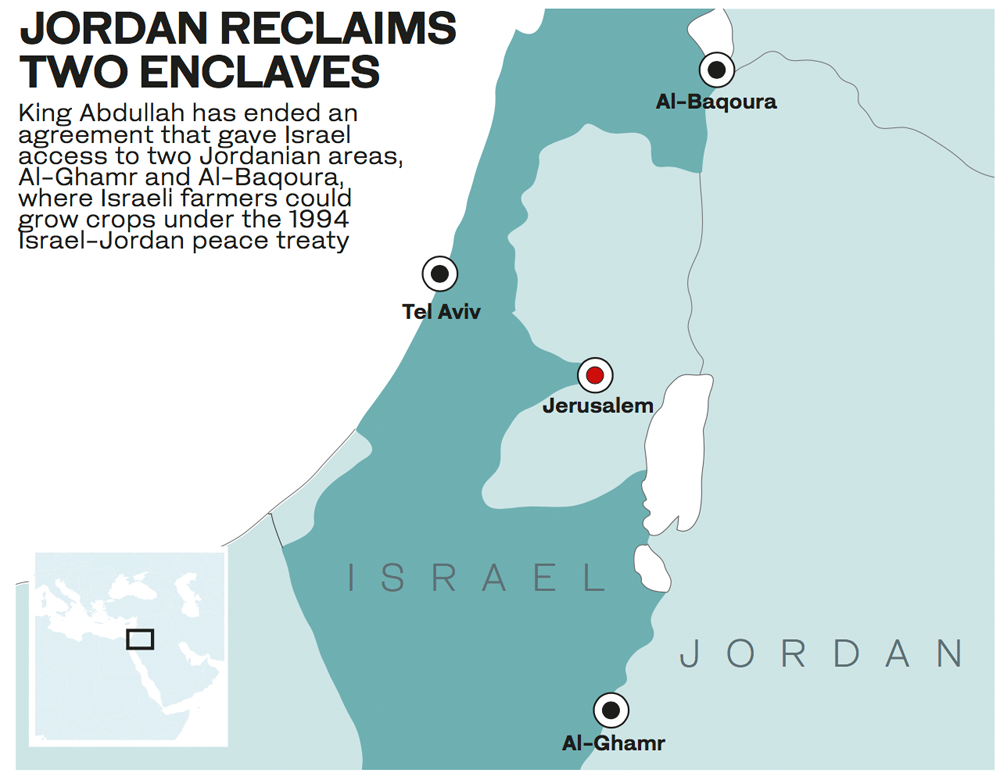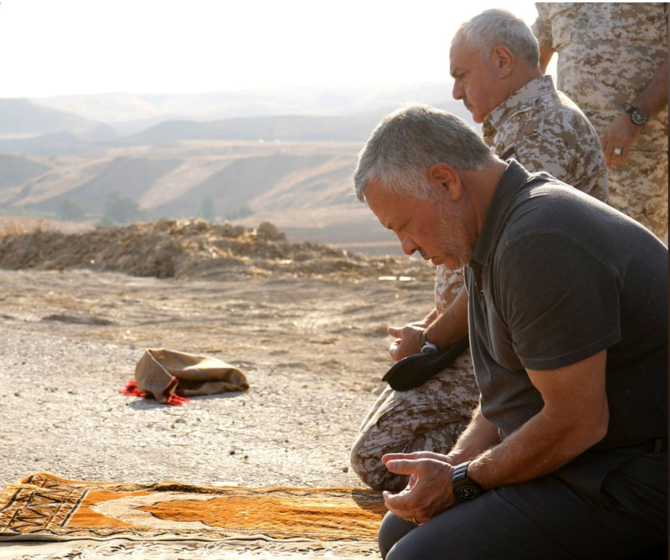AMMAN: Few Jordanians had expected it to happen, so when the Royal Jordanian Army raised the national flag over the twin enclaves of Al-Baqoura and Al-Ghamr on Sunday, the mood across the country was a mix of delight and satisfaction.
On Monday, Jordanian TV showed King Abdullah II, in military uniform, touring Al-Baqoura, accompanied by Crown Prince Hussein and the army’s chief of staff, Maj. Gen. Yousef Huneiti.
The events this week mark the end of a controversial 25-year-old lease agreement that came as a part of the 1994 Jordan-Israel peace treaty.
In 1950, Israel took the 6,000 dunams (1,482.63 acres) that make up Al-Baqoura, including an 820 dunam plot that the British Mandate government had given to Pinhas Rottenberg, a Zionist leader, in 1926 to build an electricity-generating company using the waters of the Jordan and Yarmouk Rivers.

Jordan's king Abdullah and a delegation take part in a ceremony in Baquora area, in border between Jordan and Israel, November 11, 2019 ( Reuters photo)
During the 1967 war, Israel captured a further 4,000 dunams of land in Al-Ghamr, south of the Dead Sea. The plots in both Al-Baqoura and Al-Ghamr are rich in water supplies from natural aquifers located in Jordanian territory.
Jamal Jeet, an attorney and spokesman for the unified Jordanian Hirak (movement), knew more than a year ago that strong public support was needed if Amman intended to refuse to renew the lease agreement.
Annex 1b and 1c of the Jordan-Israel peace treaty allowed Israeli farmers to continue farming those tracts without paying any fees or taxes to Jordan. But Jeet was aware that the same section permitted the abrogation of the lease agreement, provided one side gave the other a year’s notice.
“I knew that the land was Jordanian and that we needed to cancel the 25-year-old lease,” Jeet said. As he told members of the Jordanian Bar Association: “We need(ed) to do something unorthodox.”
“I wanted advice from the association’s head, Mazen Rosheidat, about an idea I had,” he told Arab News.
“We didn’t want to issue a statement and make a symbolic act of protest. I wanted a legal notice to be issued and delivered at every courthouse in Jordan.”
Rosheidat not only welcomed the idea but suggested that it be brought under the auspices of the bar association. Two committees were formed — one to draft the text of the legal petition, and the other to help distribute it.
“Once the legal documents were ready, we made sure that a lawyer would take the lawsuit to the local courthouse and deposit it with the court clerk,” he said.
The document called on the government to issue a one-year notice — before November 2018 — for a formal end to the lease arrangement.
Jeet also made sure that activists throughout Jordan took part in a campaign in tandem with the legal process.
A mural was placed at the Jordanian Professional Association’s headquarters in Amman and hundreds of lawyers, doctors and engineers signed the document calling on the government of Omar Razzaz to issue the warning.
The campaign could not have occurred at more politically opportune moment. Ties between Jordan and Israel had cooled due to a number of decisions by Israeli Prime Minister Benjamin Netanyahu, including the withdrawal of support for a two-state solution, a refusal to stop Jewish hardliners from praying at the Al-Aqsa Mosque compound, and the sidelining of Jordan as the administration of US President Donald Trump worked on a new Middle East peace plan.
FASTFACTS
• Al-Baqoura is 6,000 dunams of fertile, aquifer-rich land east of Jordan River.
• Al-Ghamr is a 4 kilometer-wide, aquifer-rich area of land along Jordanian border, within Aqaba governorate.
• Israel occupied Al-Baqoura in 1950 and 4,000 additional dunams of land in Al-Ghamr, south of the Dead Sea, in 1967.
• Jordan and Israel signed Wadi Araba Peace Treaty in 1994.
• Jordan announced in October 2018 it would not renew the 25-year lease.
• The lease officially expired on Nov. 10, 2019.
The relationship had deteriorated so much that Abdullah had stopped taking phone calls from Netanyahu, after the Israeli leader was seen greeting an Israeli security guard who had shot two Jordanians and returned home after Amman, respecting his diplomatic immunity, handed him over. The guard did not face any legal action upon his return.
For Jeet, the very first sign that the association’s campaign had been successful came when the king issued a short tweet on the issue on October 18 last year. “Al-Baqoura and Al-Ghamr have been on the top of our priorities and our decision is to end the annexes in the peace treaty in light of what is good for Jordan and Jordanians,” it said.
That post kicked off a series of legal steps, culminating in the official decision to allow the Al-Baqoura and Al-Ghamr lease agreements to expire.
The Jordanian government’s decision was not strongly contested by Israel, which had been preoccupied with two election campaigns and a corruption scandal embroiling Netanyahu.
For Kamel Abu Jaber, a former Jordanian foreign minister, the significance of the return of Al-Baqoura and Al-Ghamr cannot be overstated.
“This is very important not only to Jordan but to the Arab and Islamic worlds,” he told Arab News. “It shows that the peace treaty, with all its problems, produced the return of the land.
“Jordan is able to put pressure on Israel as a result of Article 9 of the treaty with Israel.”
For his part, Adnan Abu Odeh, who served as an advisor to both Abdullah and the late King Hussein, and as Jordan’s permanent representative at the UN until 1992, says the return of two enclaves will encourage Jordanians.
“It is important because it encourages Jordanians to keep pushing for their rights and their interests, and (because) the government responded positively to public demands,” he told Arab News.
Abu Odeh pointed out that in recent months Jordan had confronted Israel using legal means, such as its move to recall its ambassador, an action that prompted Israel to release two Jordanians.
“I hope that this will bring about further change in Israel’s (behavior) in terms of what is happening in Jerusalem,” Abu Odeh said.
Jordanians who had gathered near Al-Ghamr on Monday were permitted by the Jordanian army to visit the reclaimed tracts of agricultural land. Al-Baqoura remains a closed military area.
Jeet told Arab News he was cautiously optimistic but keeping his emotions in check. “We plan to hold a major rally to celebrate the return of Jordanian land,” he said, adding that he was disappointed a planned press conference by the foreign ministry at the Al-Ghamr site was moved to Amman.
He said what also worried him was a statement by a ministry source that Amman had assented to a one-time visit by Israeli farmers to harvest what was planted before the end of the lease.
Ayman Safadi, Jordan’s foreign minister, said on Monday that Israel had given the names of four non-Israelis who would be harvesting the land.
He said the press conference was moved to Amman because the original site in Al-Ghamr lacked the requisite technical facilities.
Ofer Zalzberg, a senior analyst for the International Crisis Group, told Arab News that Jordan has come out a winner in the latest negotiations.
“Amman’s decision to terminate the state-to-state arrangement and allow only a one-time, six-month extension should come as no surprise,” he told Arab News.
“Time will tell whether Israeli farmers who own land inside Jordan would be able to arrive at a new technical access arrangement to continue farming their lands while residing in Israel.
“Such a private arrangement may be possible only if it excludes the Israeli government and is devised exclusively within the bounds of Jordanian law.”


























